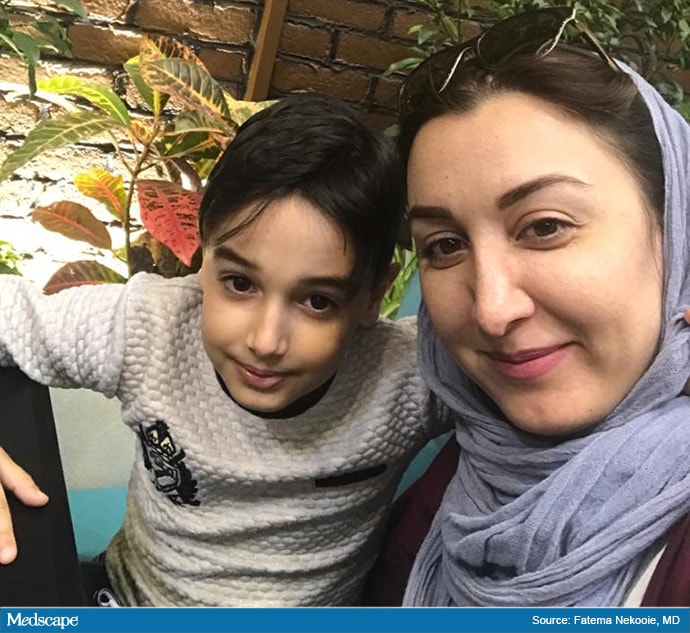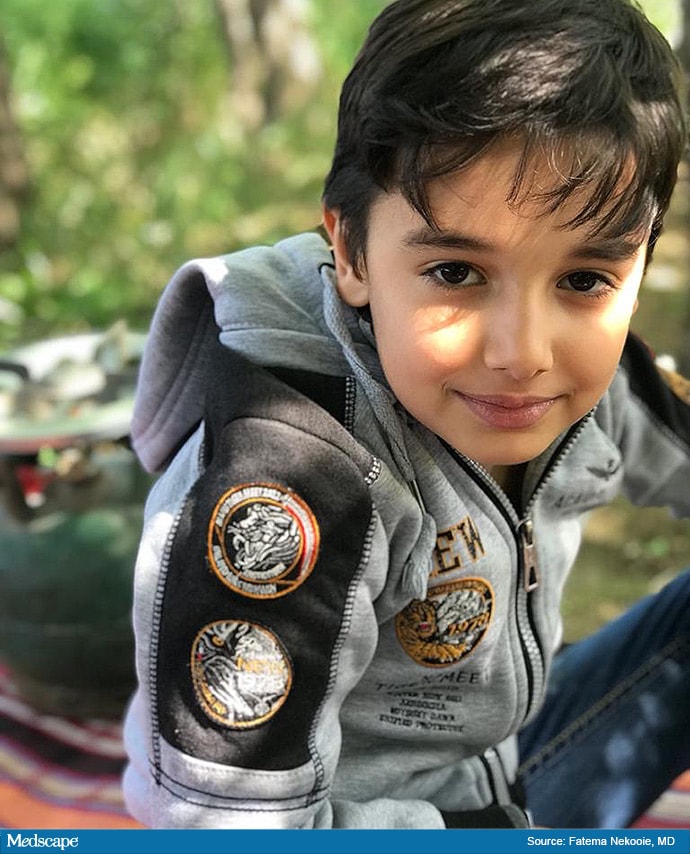Physician-Mother Investigates Son's Mysterious Illness - Medscape
The 9-year-old son of Fatema Nekooie, MD, suddenly threw up on a weekend night in mid-June. Nekooie guessed she was up against a gastrointestinal virus and a sleepless night ― maybe two. A colleague in pediatrics affirmed her suspicions.
But Kiarash's nausea, vomiting, and abdominal pain were only the first in a series of unexplained symptoms that spurred an intense and ongoing medical investigation. Nekooei, a cardiologist in Bushehr, Iran, combined her roles as mother and physician and used every resource and connection she had.

Nekooei and 9-year-old Kiarash.
Kiarash's initial symptoms resolved after 5 days. But a few days after that, Nekooei noticed swelling and erythema of her son's genitals while she was bathing him. On the way to the emergency department, she called a urologist, who ordered labs and an ultrasound of the genital region. The sonography came back normal, but Kiarash's white blood cell (WBC) count was up to 21,000/μL, nearly double what it had been when he was tested just days earlier.
A repeat sonography the next morning showed a small increase in blood flow to the right epididim. The doctor ordered a course of antibiotics, and on the second day, the swelling disappeared. All the physicians who examined him at the hospital believed the swelling must have been in response to a virus. After 2 days, they sent Kiarash home and told Nekooei to follow up in a month. "His doctors told me that we should be patient," Nekooei told Medscape.
Her son's abdominal pain came back in mid-July, accompanied by skin lesions along his cheek, chin, and neck. Nekooei ordered labs. His WBC count had skyrocketed to 37,000/μL, with 55% eosinophils.
Looking for help, she posted a description of her son's evolving symptoms and lab test results on Medscape Consult, a social media platform where doctors share cases and advice on patient care. Her post quickly gained more than 100 responses and a global following. "All your advices [sic] will be useful for better management," she wrote. She left her telephone and WhatsApp numbers for direct contact.
"It's Very Difficult to Be in This Position"
Her son's mysterious symptoms brought up painful memories for Nekooei. A few years earlier, her husband had suffered from an unclear illness. He had an abdominal mass, his platelet count was decreased, and he bruised easily. There were any number of possible diagnoses. "Many tests could not be done in Iran," Nekooei said. His physicians were unable to determine the cause of his symptoms, and he came close to dying.
Her husband recovered after a splenectomy, but the near loss and painful memory of her own limitations still cause Nekooei grief. She cried when retelling the story. "It's very difficult to be in this position," Nekooei told Medsape, one where her medical training and resources aren't enough. Watching her son's symptoms this summer, once again, her medical expertise felt wildly insufficient.
Her son's high WBC counts immediately made her think about malignancies. Nekooei called hematologist and oncologist Nader Shakibazad, MD. He urged the family of three to meet him at his office, and he immediately prescribed prednisone to manage the boy's toxic levels of eosinophils. Kiarash underwent scans and biopsies over the next 24 hours. The boy's bone marrow CD34/CD117 expression was less than 1%, eliminating cancer from the differential diagnosis. "I was just good for a day ― relieved for a day," Nekooei said. "But after that, I searched more and more."
After ruling out a malignancy, Shakibazad posited hypereosinophilic syndrome, but admitted that there could be any number of possible disorders.

Testing ruled out a malignancy as the cause of Kiarash's mysterious symtpoms, but his mother remained anxious.
Nekooei began spending her nights researching hypereosinophilia and collecting insight from other physicians across the country and the world. She created a group chat to consult with local colleagues in pediatrics, infectious disease, and hematology.
Her post to Medscape Consult received a resounding call to test for parasites, particularly Strongyloides, Filarioidea, Toxocara, and schistosomes. Others suggested hereditary edema, polyarteritis nodosa, and a mutation of the familial Mediterranean fever (FMF) gene.
Nekooei brought her research and suggestions from physicians on Consult to Shakibazad, who promptly tested Kiarash's stool and blood for parasites. All results came back negative. But they had no way to assess parasite serology ― a way to detect parasite antigens that is especially helpful in diagnosing hard-to-find parasites. A key component of the assay hasn't been available in Iran for more than a year. Despite numerous calls to physicians in Tehran, Nekooei couldn't find a way to have the test performed.
Serologic testing is ideal, according to Gary Procop, MD, director of the Parasitology Laboratory at Cleveland Clinic, in Ohio, because some of the worms that Consult commenters mentioned reside deep in the tissue and can be hard to catch. "Fifty-five percent [eosinophils] is pretty telling of a parasite," he said. There are alternatives to serology: there have been reports of filarial worms in Iran, Procop said, "which you can test for by looking at blood or skin snips."
Stalled in testing for parasites, Shakibazad ruled out all autoimmune disorders and splenomegaly, suggested because of the father's history. He also tested for the FMF gene mutation and is awaiting results. Meanwhile, Kiarash's symptoms resolved with the prednisone, but his eosinophils spiked after his regimen had been tapered off. He's now receiving a low, daily dose while awaiting the results of genetic testing. If an FMF gene mutation isn't found, Azad says his plan is to continue treatment with low-dose prednisone for hypereosinophilia.
Other posters on Consult, however, were resistant to calling idiopathic hypereosinophilia a final diagnosis. One commenter suggested that this case "calls for full hematological-parasitogical-immunological clarification." Nekooei shares their unease. She worries constantly that her son's high eosinophil levels are symptomatic of an unknown ― and untreated ― disorder.
"She's Living This 24/7"
Combining the roles of mother and treating physician can cause unique emotional and ethical quandaries, which is why several doctors on Consult asked Nekooei whether she was getting help from local colleagues.
When treating a family member, it becomes nearly impossible to have the rational detachment needed to make treatment decisions and allocate hospital resources, said Brendan Parent, JD, a medical ethicist at NYU Langone, in New York City. By deferring to other physicians on all treatment decisions and caring for her son at home rather than in a hospital, where many patients need similar resources, Parent said Nekooei makes use of her resources while evading major ethical conundrums.
But the emotional toll is not so easily sidestepped, said Cynthia Stonnington, MD, a psychiatrist at Mayo Clinic in Phoenix, Arizona, who studies physician joy and burnout. "It's hard to be objective and compartmentalize" when it's your own child, Stonnington said. "She's living this 24/7."
According to Stonnington's research, when a mother who is a doctor takes on the coordination of care for her child, effectively stepping into the role of primary care physician, "the pressure you put on yourself and the inability to create boundaries that we absolutely need, that's a recipe for burnout," she told Medscape.
Nekooei's life has become a delicate balance of doing everything she can as a physician while managing her worst fears as a mother. She's anxious and losing sleep as she waits for genetic results or, worse, for the symptoms to return. She's stopped her late-night Internet searches to usher some calm back into her life. She finds some solace in Kiarash's partial return to normalcy. He now runs around the house, laughs at English cartoons, and plays on his Playstation as if nothing has changed.
Nekooei said she knows other physicians who handle their family's medical problems, "but for me it's very difficult." She is never sure if her care is good enough, never able to step away. "I'm afraid of the future," she said.
Donavyn Coffey is a freelance journalist in New York City. She interned for Medscape in the fall of 2019.
For more news, follow Medscape on Facebook, Twitter, Instagram, and YouTube. Here's how to send Medscape a story tip.
https://ift.tt/2IklNCi

Comments
Post a Comment